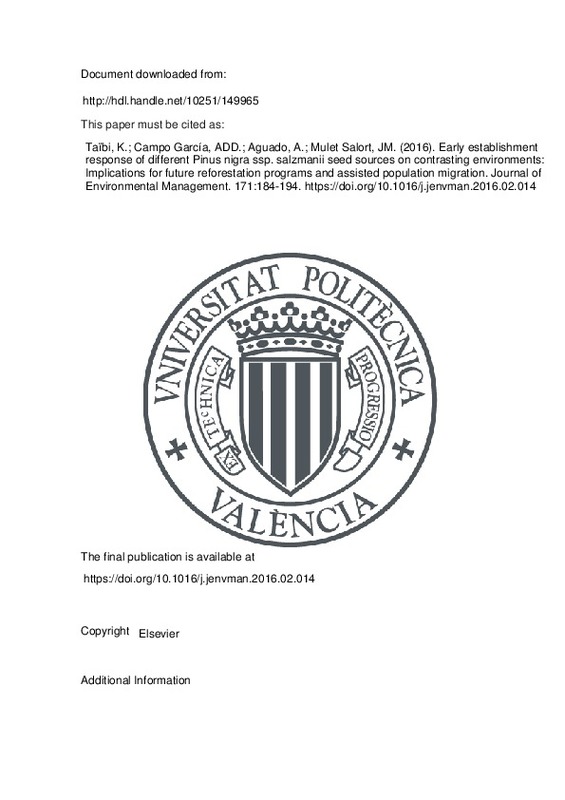JavaScript is disabled for your browser. Some features of this site may not work without it.
Buscar en RiuNet
Listar
Mi cuenta
Estadísticas
Ayuda RiuNet
Admin. UPV
Early establishment response of different Pinus nigra ssp. salzmanii seed sources on contrasting environments: Implications for future reforestation programs and assisted population migration
Mostrar el registro completo del ítem
Taïbi, K.; Campo García, ADD.; Aguado, A.; Mulet Salort, JM. (2016). Early establishment response of different Pinus nigra ssp. salzmanii seed sources on contrasting environments: Implications for future reforestation programs and assisted population migration. Journal of Environmental Management. 171:184-194. https://doi.org/10.1016/j.jenvman.2016.02.014
Por favor, use este identificador para citar o enlazar este ítem: http://hdl.handle.net/10251/149965
Ficheros en el ítem
Metadatos del ítem
| Título: | Early establishment response of different Pinus nigra ssp. salzmanii seed sources on contrasting environments: Implications for future reforestation programs and assisted population migration | |
| Autor: | Taïbi, Khaled AGUADO, A. | |
| Entidad UPV: |
|
|
| Fecha difusión: |
|
|
| Resumen: |
[EN] Forest restoration constitutes an important issue within adaptive environmental management for
climate change at global scale. However, effective implementation of these programs can only be achieved
by revising ...[+]
|
|
| Palabras clave: |
|
|
| Derechos de uso: | Reconocimiento - No comercial - Sin obra derivada (by-nc-nd) | |
| Fuente: |
|
|
| DOI: |
|
|
| Editorial: |
|
|
| Versión del editor: | https://doi.org/10.1016/j.jenvman.2016.02.014 | |
| Código del Proyecto: |
|
|
| Agradecimientos: |
This study is a part of the research project: "Application of molecular biology techniques in forest restoration in Mediterranean environments, PAID-05-11" funded by the Universitat Politecnica de Valencia (UPV), program ...[+]
|
|
| Tipo: |
|







![[Cerrado]](/themes/UPV/images/candado.png)


